11 Aug 2021: Thailand’s Success in Combating IUU Fishing
(Information Source: Department of Fisheries, Ministry of Agriculture and Cooperatives, on Fri Jul 10, 2020)
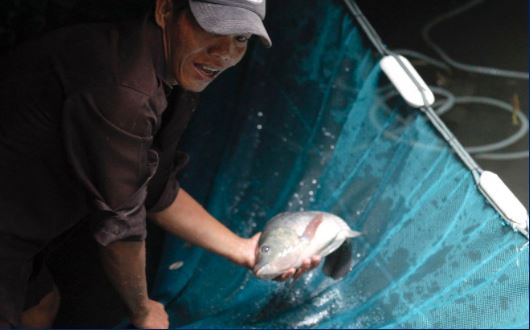
-
In just over 3 years (2015-2018) Thailand has built a new future for its fisheries and seafood industry through a national root and branch reform programme.
-
Thai fisheries and seafood products are now safer, more legal, sustainable, environmentally and socially friendly and IUU-Free.
-
Our products can be traced through a new enhanced e-traceability system – we trace from sea to plate.
Thai Fisheries and Seafood Industry
Thailand’s fisheries and seafood industry is a world player – and vital for Thailand’s economy.
Thailand is the third largest exporter of fishery and seafood products in the world, accounting for around 8% of total world exports. It is the European Union (EU)’s 5th largest seafood trade partner with a trade value of €426 million (2016). With a GDP contribution of €3.2 billion, the Thai fisheries sector is also vital for the Thai economy and for the livelihoods of approximately 2 million people working in the industry.
Illegal, unreported and unregulated (IUU) fishing is a global challenge. Between 11 and 26 million tons of fish are caught illegally every year - which is around 15% of all world catches. As one of the world’s largest seafood processors and exporters Thailand has taken its responsibility to tackle this global challenge very seriously.
3rd larger exporter
8% of total world exports
2 million jobs in 2,500 fishing villages
5th EU seafood trade partner
€426 million EU-Thailand seafood trade
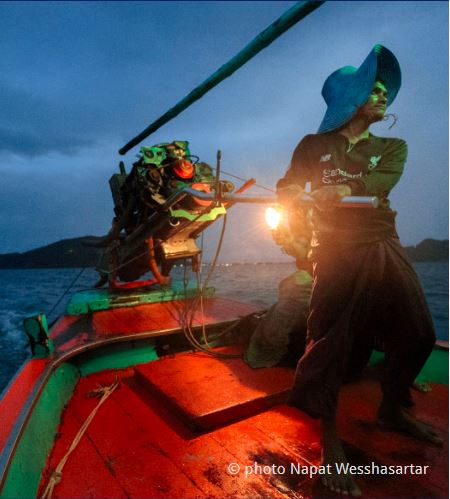
What is “IUU-Free Thailand”?
“IUU-Free Thailand” means fish and fisheries products imported into and exported from Thailand (not only to the EU but also all other non-EU countries around the world) do not come from IUU activities and that IUU fish and fisheries products do not infiltrate our supply chain. Thai authorities are committed to conducting stringent Monitoring, Control and Surveillance (MSC) activities both in Thai waters, and in the high seas, in close cooperation with relevant neighbouring countries. We have built a robust system that we now enforce with strict deterrent sanctions. We will continue combatting IUU fishing to prevent and limit the access of any IUU fish into our supply chain.
Our goal is to build a more competitive, ethical, sustainable, environmentally and socially friendly fisheries and seafood industry, and more importantly to protect our seas and oceans for generations to come.
Sustainability and IUU-Free Goal
Thai seafood products are renowned for their high-quality, food safety, and competitive pricing. The goal of the Thai government is to ensure an ever more sustainable, ethical, environmentally and socially friendly fisheries and seafood industry. Combatting Illegal, Unreported and Unregulated (IUU) fishing and eventually achieving an “IUU Free” Thailand is a major part of this overall goal and is a policy priority for Thailand.
Thai Fisheries & Seafood fleet
37,000 vessels (August, 2018)
26% reduction over 2015-2018
70% artisanal fishing (less than 10 GT)
30% commercial fishing (10 GT and above)
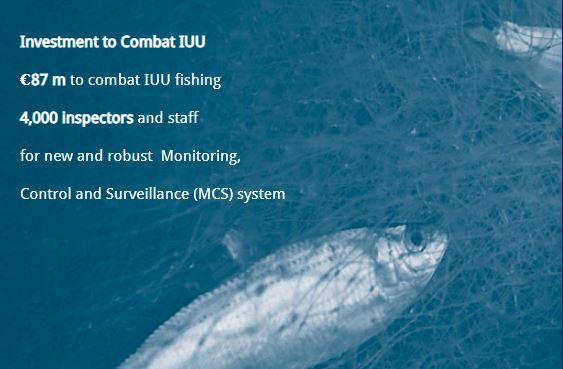
Fundamental Fisheries Reform
Since 2015 we have been engaged in fundamental reform of the Thai Fisheries and seafood sector.
Thailand now has a fisheries governance system that complies with all EU and international laws and standards, including the EU’s IUU Regulation.
Following receipt of the EU’s IUU yellow card in April 2015 Thailand has overhauled and modernized its fishing and fisheries sector and built a robust new legal and policy framework to ensure a more sustainable, ethical, environmentally and socially friendly industry. Between May 2015 and September 2018, the Thai government has allocated approximately €87million to combat IUU fishing.
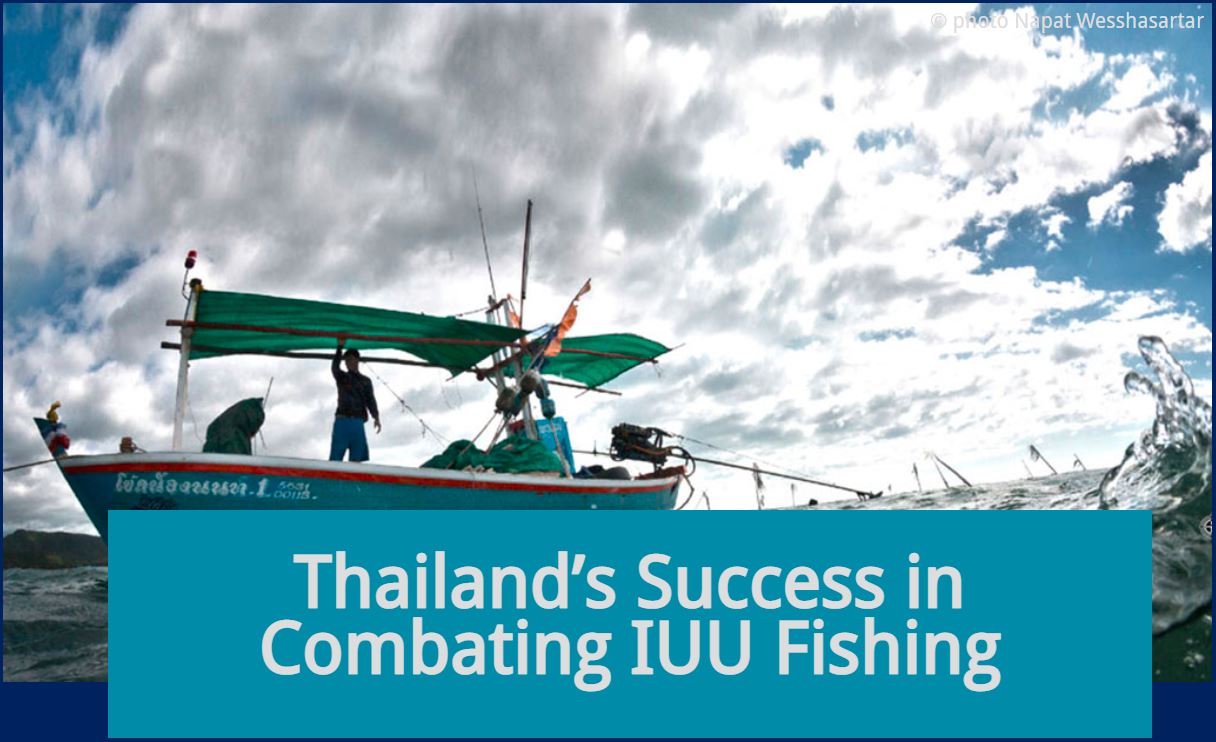
I. New Fisheries and Marine Laws
-
the new Thai Fisheries Laws and regulations can be seen as some of the most robust fisheries laws in the world.
-
IUU fishing is recognised as an international crime.
-
Punitively high penalty fees of up to THB 30 million (€780,000) or five times the value of the catch obtained, can be applied.
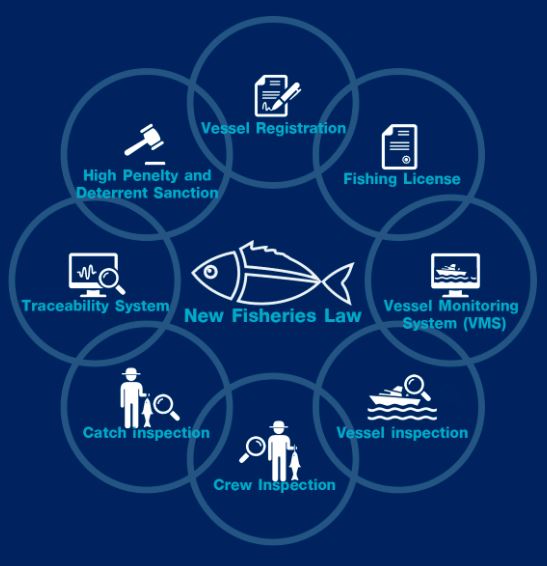
Prior to 2015 Thailand’s legal framework was not able to fulfil its obligations under the United Nations Convention on the Law of the Sea (UNCLOS) and other international agreements with respect to the conservation and management of aquatic living resources.
The Royal Ordinance on Fisheries B.E. 2558 (2015) was brought into law in 2015. It is a comprehensive legal framework not only on the prevention and deterrence of IUU fishing, but also on marine resource management and conservation.
It was enacted within seven months of the EU’s yellow card being issued and has enabled Thailand to implement its first sustainable Fisheries Management Policy. Thailand also become a party to key international treaties such as the United Nations Fish Stock Agreement (UNFSA), Agreement on Port State Measures to Prevent, Deter and Eliminate IUU fishing, (PSMA) and other Regional Fisheries Management Organisation (RFMO) agreements. It has been the bedrock of change in our fisheries and seafood industry.
A key aspect of this new Thai fisheries law is that it recognises IUU fishing as an international crime and also introduces serious sanctions to ensure effective compliance. Owners of vessels and factories found to be involved in any illegal activities will face both administrative sanctions (e.g. prohibition of fishing activity, suspension of fishing licenses or detention of vessels) and criminal sanctions. Punitively high penalty fees of up to THB 30 million (€780,000) or five times the value of the catch obtained, can be applied.
The Royal Ordinance was subsequently amended in 2017 and is now supported by 138 supporting regulations.
In addition, the Royal Ordinance on Thai Vessels B.E. 2561 (2018) was brought into law in March 2018, and implementing regulations for the Navigation in Thai Waters Act were also passed aiming to combat IUU fishing.
II. Strategic Policy Framework
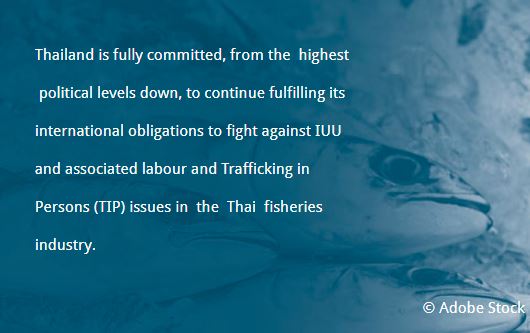
Thailand’s Fisheries Management Plan (FMP) 2015-2019 and the National Plan of Action on IUU (NPOA-IUU) came into force on 29th December 2015. Since then the Thai authorities have started to implement the FMP which aims to reduce fishing capacity and ensure that Thailand develops a more sustainable fishing and fisheries sector and is better able to protect its marine resources.
The Department of Fisheries (DOF), as a Competent Authority (CA), will soon propose the next 5-year strategic FMP, revising and setting out the overall policy objectives, targets and measures for approval by the National Fisheries Committee. The FMP will continue to include the high-level objectives and targets related to IUU free fishing.
Moreover, the Combating IUU Fishing Committee, which was set up in April 2018, will bring all efforts across the Thai government agencies together to ensure continued momentum on Thailand’s journey to combat IUU fishing, and be responsible for developing the country’s overarching strategy to combat IUU fishing.
III. Overhauled Fisheries Management System
Thailand now has in place a sustainable resources and fleet management system. Prior to 2015 the registration of fishing vessels and the fishing licensing process were not aligned with the objective of managing fishing efforts or fish stocks. It was too easy to apply for and be granted a vessel registration and fishing license. This resulted in an increasingly unsustainable fishing practice and depletions of fisheries resources in Thai waters.
The new fisheries law changed the conservation and management of Thailand’s aquatic living resources from an “open access” system to a controlled system under a licensing regime. This was based on scientific evidence of maximum sustainable yield (MSY) and a prescribed total allowable catch to prevent overexploitation.
Actions towards Sustainable Fisheries Management System
-
Defined a new legal framework for fishing licensing and vessel registration.
-
Controlled fishing effort through catch limits based on MSY and gear regulations.
-
Controlled fishing vessel registration with moratoriums, surveys and regulations.
-
Increased collaboration through joint work flows and standard operating procedures among all relevant authorities and more widely to ASEAN member cooperation.
-
Implemented new operational systems for licensing and registration.
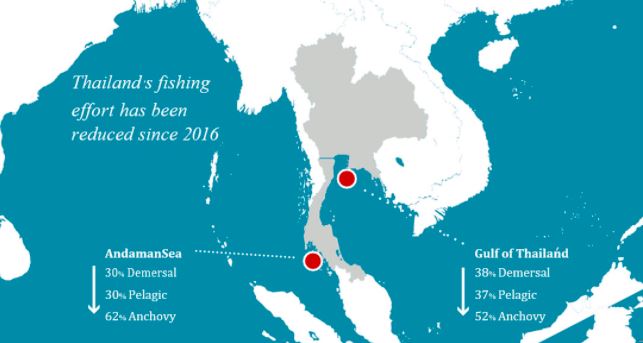
IV. Robust Monitoring, Control and Surveillance (MCS) System
Since 2015 Thailand has made significant progress in putting in place a comprehensive legal framework to enable control and enforcement of MCS activities. To do this it has developed and implemented, from scratch, a robust and well-integrated Monitoring, Control and Surveillance (MCS) system which allows Thailand to prevent, deter and prosecute any perpetrators involved in IUU fishing activities through closer inter-agency coordination.
Thai MCS activities cover at port inspections, sea inspections, air surveillance and remote surveillance via the Fisheries Monitoring Centre (FMC). The FMC was established in 2016. Collectively all of this forms an integrated MCS and allows us to enforce our laws and regulations.
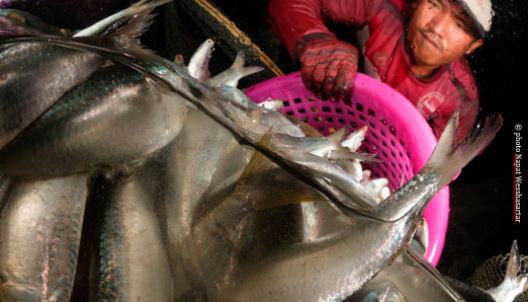
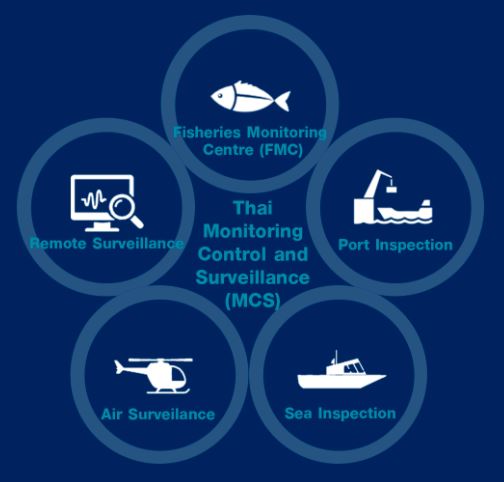
-
Establishment of Fisheries Monitoring Centre (FMC) in 2016
-
Port, sea and air inspections
-
Integrated state of the art IT system to ensure effective remote surveillance
-
Vessel Monitoring System (VMS) installed in all Thai commercial vessels
-
Port In-Port Out (PIPO) control of Thai flagged vessels
-
Strict implementation of Post State Measures (PSM) to inspect foreign vessels
-
Effective inter-agency coordination with more than 4,000 officers
Port in Port Out (PIPO) control to inspect Thai vessels
30 Port In Port Out (PIPO) Centers have been set up, together with 21 Forward Inspection Points (FIPs) along the coast of Thailand to inspect vessels at port. This relates to vessels of 30 GT and above as well as vessels with 3 types of fishing gears (trawler, purse seine and anchovy falling net) <30 GT. PIPO officers not only check all necessary documentation but also inspect vessels, fishing gear, catch, VMS signals and crew on board.
Strengthening import control and inspecting foreign vessels entering Thai ports
Since 2015, Thailand has started to implement some parts of the Port State Measures (PSM). However, the Thai legal framework was deficient in enforcing the PSM, rendering the implementation of the PSM ineffective. The Royal Ordinance on Fisheries B.E. 2558 (2015) then empowered the Thai authorities to control Thai fishing ports and take strong enforcement actions against foreign flagged fishing vessels having been involved in IUU fishing or suspicious of IUU activities. This enabled Thailand to accede to the Agreement on Port State Measures (PSMA) in May 2016.A
However, because the PSM only applied to foreign flagged fishing and carrier vessels, DOF designed the Import Control Scheme to cover all imported fish and fishery products. The import control system, to be described in Traceability section, now links all agencies’ workflows, IT systems and data. This enables Thai authorities to prevent illegally caught fish from entering into the domestic supply chain and international markets from all modes of transport.
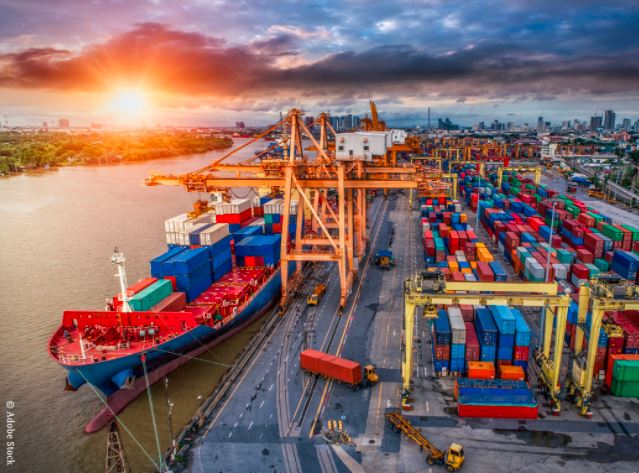
Technology used to control Thai-flagged overseas vessels operating outside Thai water
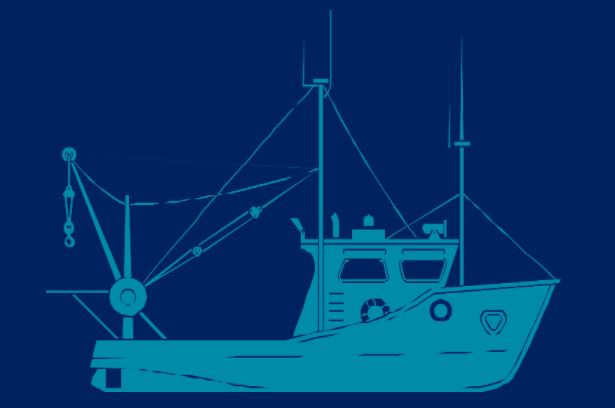
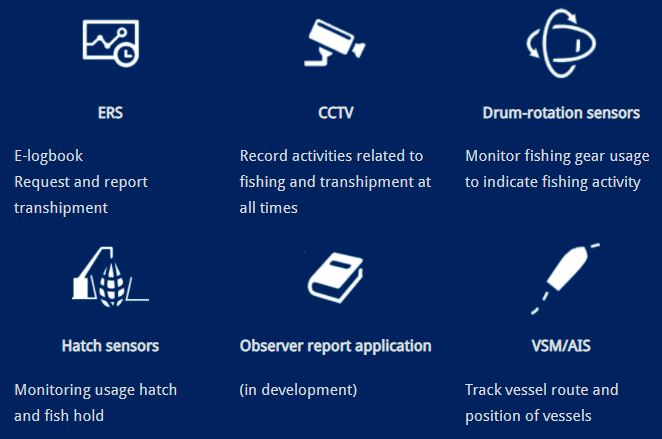
V. More Rigorous Law Enforcement & Deterrent Sanctions
Since the new fisheries law came into force in 2015 Thailand has prosecuted more than 4,200 IUU cases.
Thailand recognizes that it needs to give teeth to its new laws and as such has adopted a policy of strict enforcement and prosecution. This means that with faster processing of cases and higher sanctions we have seen a much higher conclusion rate for IUU cases:
-
Significant deterrent measures have been implemented with higher fines and administrative sanctions
-
Legal processes have been expedited
-
Thailand is taking actions against IUU fishing beyond its shores by actively combating problems relating to its overseas fleet
In 2018, Thailand has issued significant fines of over THB 100 million (ca. €3 million) for certain overseas fleet violations. Thailand has also started to take legal actions against Thai-owned, foreign flagged vessels involved in IUU fishing.
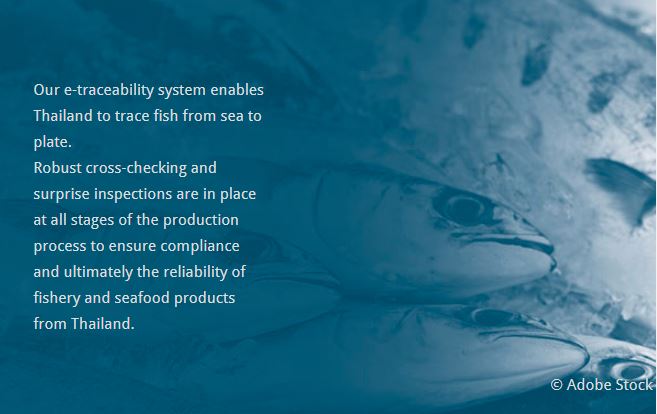
VI. New Enhanced Traceability System
Thailand has established a comprehensive traceability system covering the whole supply chain as well as all modes of transportation to combat IUU fishing, in line with international standards. The Thai Flagged Catch Certification Scheme and the Import Control Scheme ensure complete product traceability at each and every stage of production – from catch landing to offloading, processing and, ultimately, export. This complete e-traceability system ensures that no illegal fish enters the supply chain of fish and fishery products designated for the EU market.
Consignments of processed fish that have received certificates permitting their export to the EU can now be traced back to the vessel and specific batch of fish offloaded at Thai ports.
Catch Certificates (CC) and Processing Statements (PS) are to be validated and issued through the electronic system.
Processing factories are inspected at any time of the day or night.
VII. Preventing Labour Exploitation
Thailand has prioritised efforts to prevent and eliminate labour exploitation in the fisheries and seafood sector. This has been supported by an overhaul of labour protection and migration management laws and policies, and the establishment of robust systems for monitoring and oversight of work in the fisheries and seafood industry.
Framework to Eliminate Labour Exploitation
-
110,000 people have been classified as migrant workers employed in the fishing and fisheries sectors. They have all been registered and are working legally as of August 2018.
-
As of today 98% of the migrants working in the seafood sector have entered Thailand through legal channels, or have been regularised through nationality verification procedures.
-
Thailand has strengthened labour inspections, driven by a 165% increase in the number of labour inspectors since 2015 and a 180% increase in the number of interpreters since 2016.
-
Thailand is focused on ensuring that a higher proportion of migrant workers seeking work in the seafood sector enter Thailand through legal channels. In 2017, the number of workers working under official Memorandum of Understanding (MoU) arrangements increased more than ten-fold from 2016 levels. Moreover, the Ministry of Labour has reduced the costs of MoU applications by 64%, reduced Thai-side processing times by 40% (25 to 15 days), and strengthened the protection of incoming migrants.
-
Enhanced enforcement efforts; evidenced by the proportion of inspections resulting in the identification of a labour infringement in 2018 increasing 663% on the previous year. Moreover, the number of employers prosecuted under labour protection laws has steadily increased, rising from zero in 2015 to 14 in 2018.
VIII. Proactive International Cooperation
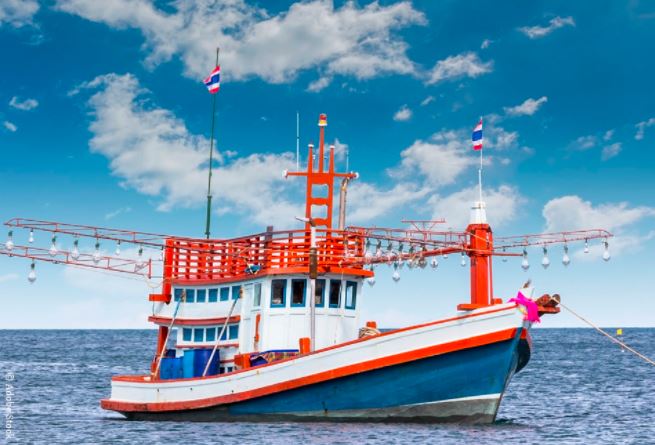
Thailand has been strengthening our cooperation with various third countries, including Flag states, Coastal states and Port states to better tackle IUU fishing. We are increasingly playing a proactive role in initiating cooperation, both at official levels through the establishment of bilateral agreements and Memorandum of Understanding (MoU) and at the operational level through the exchange of information at the level of officials.
Thailand has also continued to strengthen its cooperation with various Regional Fishery Management Organizations (RFMOs), such as the Indian Ocean Tuna Commission (IOTC). In addition, as Thailand takes the Chair of the Association of Southeast Asian Nations (ASEAN) in 2019, it will drive the setting up of an ASEAN IUU taskforce. This will be a major priority of the Thai government in 2019.
During the period 2015-2018 Thailand adopted the United Nations Fish Stock Agreement (UNFSA), the Southern Indian Ocean Fisheries Agreement (SIOFA) and the Port State Measures to Prevent, Deter and Eliminate IUU Fishing Agreement (PSMA).
IUU fishing is a global challenge, with around 15% of all world catch every year being illegal, and it is one we can only tackle together.
As one of the world’s largest seafood processors and exporters, Thailand has shown its responsibility to tackle this challenge and strive towards the goal of becoming IUU-free.
Thailand is now able to ensure that all seafood and fisheries products harvested, processed and imported to, and exported from Thailand are free of any IUU fishing or slavery.
Thailand looks forward to sharing its experience and best practice with its international partners in combating IUU. Only together can we all succeed.
